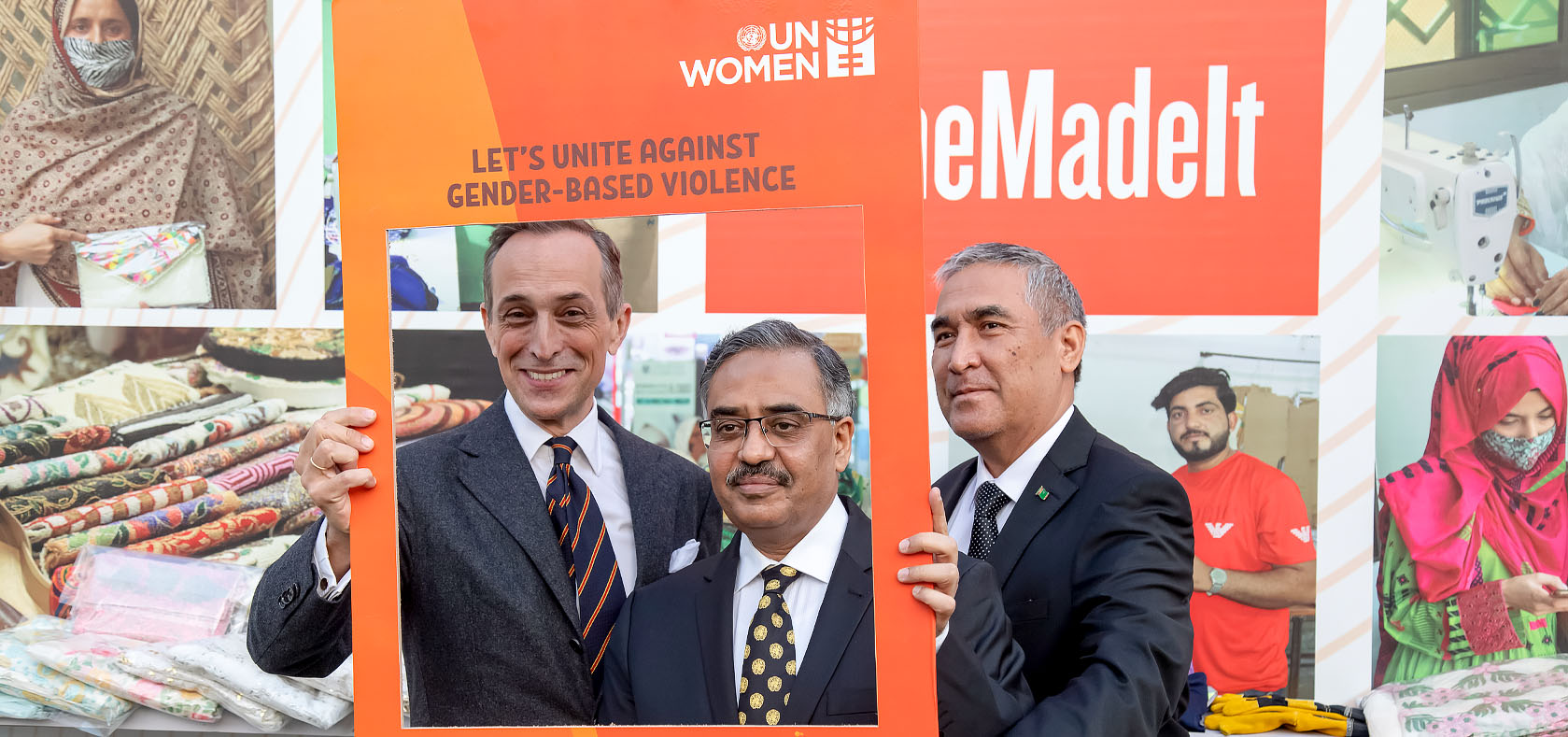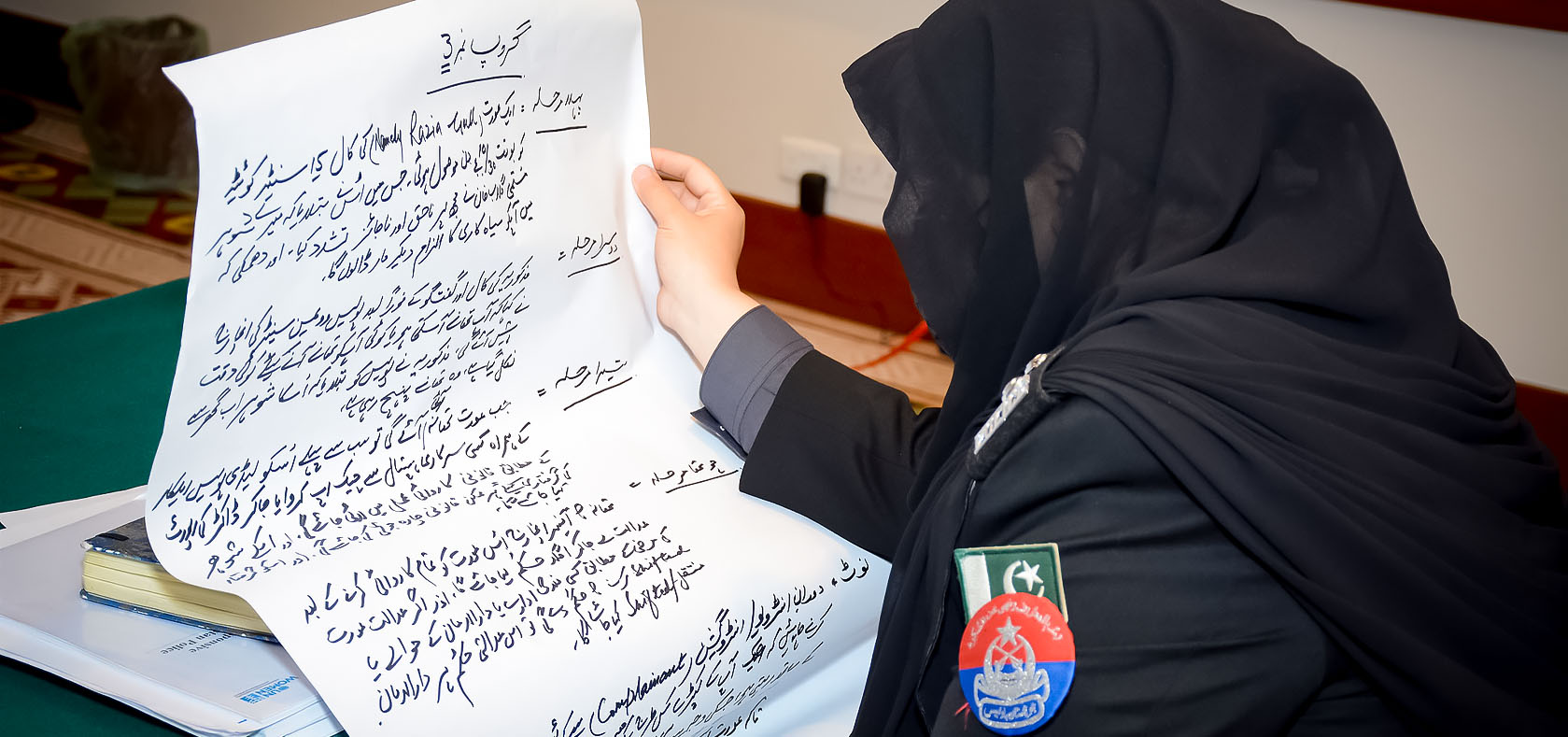Ending Violence Against Women (EVAW)

Violence against women and girls (VAWG) is one of the most widespread violations of human rights worldwide, globally affecting around one in three women in her lifetime.[1] It occurs at home, in communities, public spaces, at the workplace and online. Cutting across all distinctions of geography, class or ethnicity, it is firmly grounded in unequal power relations between women and men and reinforced by discriminatory and gender-biased attitudes, norms and practices that both contribute to such violations and allow them to continue unchallenged.
Pakistan ranks 130/139 on the World Justice Project Rule of Law Index 2021.[2] Although Pakistan has a comprehensive VAW-related legal framework, substantial efforts are required to ensure effective implementation. Patriarchal norms and gender bias result in women experiencing different forms of VAW. It is reported that 34 per cent of married women have experienced domestic violence by their husband; and 56 per cent of women who experienced physical/ sexual violence did not seek any help.[3] More than 80 per cent of women reported facing harassment in public places, yet 90.3 per cent do not consider sexual harassment to be a crime.[4]
UN Women Pakistan’s Approach
UN Women Pakistan has adopted a holistic and sequential approach to the challenges women face in access to justice which includes supporting duty bearers and rights holders at multiple levels, from policy/ legislative reform to implementation of laws and awareness-raising. It also aims to analyze the inherent legal, institutional, and socio-cultural problems experienced by women in close coordination with justice sector stakeholders, women commissions, and women parliamentary caucuses to devise strategies for redressal.
UN Women has strengthened engagement at federal, provincial and district levels with government institutions and civil society networks to design and roll out a comprehensive set of complementary and mutually reinforcing interventions, addressing each link in the chain for preventing VAW and enhancing women’s access to justice.

- Policy advocacy through development and implementation of policy and legislative frameworks including legal reforms on GEWE and interventions for economic rehabilitation and integration of survivors. UN Women also advocates on Gender Responsive Budgeting and Planning to ensure adequate financial allocations for quality services and a conducive environment for women as duty, bearers, litigants, witnesses as well as survivors of GBV.
- Capacity building of relevant national and provincial institutions/ departments and GBV response services (shelters, helplines, crisis centers, safehouses, etc.) to ensure quality, accessible, responsive and coordinated services for survivors of violence. To address gender-responsive service delivery, UN Women works with justice and security sector stakeholders on gender issues and pro-women laws related to VAWG and GBV.
- Support for effective coordination and network by establishing and strengthening networks of justice sector officials working on GBV and family cases and citizens’ networks for supporting survivors and enhancing women’s access to justice. UN Women also supports to enhance the participation and retention of women in the security sector, through improving the facilities and providing mentoring and networks for professional development.
- Data collection and usage through establishment of National Gender Data Portal to provide an evidence base on women related indicators to inform policy reform and implementation of laws and issues of access to justice. Various knowledge products including gender review of infrastructure of police stations, police training schools, courts and prisons were produced in partnership with government and academic institutions to provide strong evidence and data for effective policy formulation.
- Awareness-raising by developing broad and overarching Communication Advocacy and Mobilization Strategy to promote legal literacy among communities, especially women, and promote trust in the formal justice system. UN Women works with communities and academic institutions on campaigns to build trust in Law Enforcement Agencies and encourage young women to join these services.
Key Partners
|
|
- World Health Organization, Global and Regional Estimates of Violence against Women: Prevalence and Health Effects of Intimate Partner Violence and Non-partner Sexual violence (2013)
- Pakistan Country Insights, World Justice Project Rule of Law Index 2021
- Pakistan Demographic & Health Survey, 2017-2018
- Women’s Safety Audit in Public Places, UN Women & INL (2021)